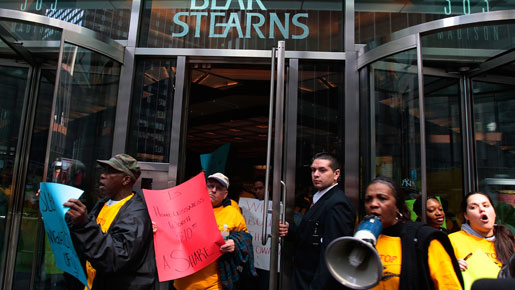
Just a few weeks ago, investors were paralyzed by fears that Bear Stearns could be the first of many financial firms to fall. But the relative calm that has settled over markets since then encouraged buyers to tiptoe back into stocks.
Now, the mood is wary once again as oil has surged more than 30 percent so far this year and economists warn that it is cutting into consumer spending and eroding corporate profits. Stock markets that had been taking cues from the latest bank rumor now slide on each new high for crude.
“For the first time in our memory, inflation, not growth, is the primary macro driver at the global level,” Merrill Lynch economists wrote in a note to clients.
“The inflation shock has already happened. What matters now is how persistent it is, and how markets and policy-makers react. At a global level, this begs for an accident that will awaken markets and policy-makers to the risks.”
The side effects will be accelerating wage growth, particularly in emerging economies, and a blow to consumer confidence in rich countries, where wages are not likely to keep up with inflation.
Confidence is already slumping in the United States, the euro zone and Japan. The next readings on euro zone consumer and economic sentiment are due on Friday, and are likely to remain weak. U.S. consumer confidence figures come on Tuesday and are hovering at recessionary levels.
“We have been in a camp saying that we won’t see a recession … but if oil continues to move higher, that could drive the United States into recession because of the strain on the consumer,” said Wendell Perkins, chief investment officer of Optique Capital Management in Racine, Wisconsin.
U.S. gasoline prices hit another record high of $3.79 per gallon last week, according to the federal Energy Information Administration. With Monday’s Memorial Day holiday marking the traditional start to the summer driving season, prices are expected to go even higher in the coming weeks.
Japanese consumer price data for April comes on Friday, and is likely to show cost pressures remain near a decade high.
Crowded overhead bins
What has caused oil’s dramatic rise this year is a subject of debate. While there is no denying strong demand from emerging economies such as India and China, some analysts wonder why oil has risen so sharply when the global economy is cooling.
They have pointed the finger at commodities speculators, a weak U.S. dollar and even the U.S. Federal Reserve, which has more than halved interest rates since mid-September.
In the corporate world, rising oil prices are taking a toll on profits because a weak economy makes it tougher to pass along the full brunt of inflation to cash-strapped consumers.
American Airlines announced last week that it was slashing jobs, retiring old aircraft and charging $15 to check luggage as it scrambles to cope with pricey oil.
Alan Mulally, chief executive of auto maker Ford Motor Co, pointed to a “real change” in demand for gas-guzzling pickup trucks and sport-utility vehicles this month.
“It seemed to us that we reached a tipping point where customers began shifting away from these vehicles at an accelerated rate,” he said.
Ford cut production through the end of the year and said it no longer expects to return to profitability next year.
Soaring energy costs have also complicated matters for central bankers, who face the unenviable task of trying to bolster growth without inadvertently stoking inflation. The normal policy response to rising prices is higher interest rates, but that risks slowing an already weak economy.
Bank of Canada Governor Mark Carney said on Thursday that the sharp rise in oil prices will be a consideration in the bank’s next monetary policy decision on June 10.
Inflation fears have also sunk deeply into the thinking at the U.S. central bank, which appears to be putting interest rate cuts on hold indefinitely as it frets about oil prices adding to broad-based consumer price pressures.
The Fed is keeping a particularly close eye on consumers’ inflation expectations, which have been creeping up in recent weeks. Should consumers conclude that inflation is here to stay, they might demand higher wages, kicking off a spiral of higher costs for goods, leading to still-higher wages.
For now, the Fed still thinks inflation will cool later this year as a weakening economy pushes unemployment higher.
“If longer-term inflation expectations were to become unmoored … then I believe that we would be facing a more serious situation,” Fed Vice Chairman Donald Kohn said.

